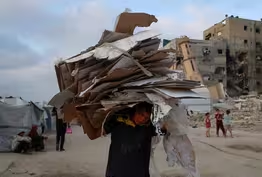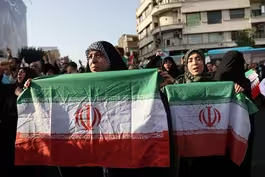
Former national security adviser analyzes U.S.-Iran strikes
Clip: 6/22/2025 | 6m 8sVideo has Closed Captions
Former national security adviser analyzes U.S. airstrikes on Iran
The Trump administration said “Operation Midnight Hammer” severely damaged or destroyed Iran’s Fordo, Isfahan and Natanz nuclear sites. For more analysis of the strikes, John Yang speaks with retired Lt. Gen. H.R. McMaster, a Hoover Institution senior fellow who served as national security adviser during Trump’s first term.
Problems playing video? | Closed Captioning Feedback
Problems playing video? | Closed Captioning Feedback
Major corporate funding for the PBS News Hour is provided by BDO, BNSF, Consumer Cellular, American Cruise Lines, and Raymond James. Funding for the PBS NewsHour Weekend is provided by...

Former national security adviser analyzes U.S.-Iran strikes
Clip: 6/22/2025 | 6m 8sVideo has Closed Captions
The Trump administration said “Operation Midnight Hammer” severely damaged or destroyed Iran’s Fordo, Isfahan and Natanz nuclear sites. For more analysis of the strikes, John Yang speaks with retired Lt. Gen. H.R. McMaster, a Hoover Institution senior fellow who served as national security adviser during Trump’s first term.
Problems playing video? | Closed Captioning Feedback
How to Watch PBS News Hour
PBS News Hour is available to stream on pbs.org and the free PBS App, available on iPhone, Apple TV, Android TV, Android smartphones, Amazon Fire TV, Amazon Fire Tablet, Roku, Samsung Smart TV, and Vizio.
Providing Support for PBS.org
Learn Moreabout PBS online sponsorshipJOHN YANG: And now for analysis of all this, we turn to retired Lt. Gen. H.R.
McMaster.
He's a Hoover Institution Senior Fellow.
He served as National Security Adviser during the first Trump administration, and he's got a new book out "At War With Ourselves: My Tour of Duty in the Trump White House."
General McMaster, what's your assessment, initial assessment of this operation?
LT. GEN. H.R.
MCMASTER (RET.)
Hoover Institution Senior Fellow: Well, John, it was extraordinarily successful, of course, put together for a limited purpose, which is kind of the definition of a raid, which is a military operation with limited purpose, short duration and planned withdrawal.
And those three sites were struck successfully without, as the Chairman said today, U.S. not even be able to identify one shot against us.
It indicates extremely high degree of training and professionalism across all of our services to be able to do something like this halfway around the world.
JOHN YANG: As you heard Secretary Rubio say, there's no plans for anything more.
But the Iranians get a vote in this, too.
What range of possible retaliation or response do you expect?
H.R.
MCMASTER: Well, John, Nick covers some of those, but we know, because they've done all of this to us in the past, right?
We know they have a worldwide terrorist network that they could activate.
Remember in '92 and '94 in the attacks in Argentina, for example, assassinations around the world, including in Europe, assassination attempts in the United States.
So it could activate that terrorist network.
They could try to strike U.S. bases, U.S. personnel.
I think they would really pay an extremely high price if they do that.
They may try to do it again, of course, through their proxies, the host Al Shaabi militias, for example, in Iraq, or maybe the Houthis could launch missiles maybe at U.S. locations or something like that.
They have a range of shorter range missiles available to them.
So they could strike U.S. bases using those missiles and maybe some drones.
Or as Nick mentioned, they could go after, as they did previously as well, Saudi Arabia and other energy and oil and gas infrastructure in the region.
They could try to conduct cyber attacks.
They did that against us, right, in 2007.
So I think that they will try to lash out in any of these ways -- in many of these ways because of the ideology of the regime and its permanent hostility, right to the Great Satan, you know, us and Israel, who they are determined to wipe off the map, which is why you couldn't allow that regime to have the most destructive weapons on Earth.
JOHN YANG: You mentioned short range missiles.
There are a number of bases that are nearby, close to Iran, closer than Israel.
Is there any security concerns about the U.S. facilities and the U.S. troops?
H.R.
MCMASTER: Yeah, there are.
And I'm sure that those defensive measures are being taken.
I think what we have to realize is that, you know, these are, you know, our servicemen and women are not waiting there to be victims.
And they are part of an integrated joint force like you saw on display with this raid.
You might recall when U.S.
Forces have been attacked in Syria, for example, when the Russian mercenaries attacked those forces in 2018.
And they got a heck of a lot more than they bargained for because you're not just attacking a little base, you're attacking all of those joint capabilities, aircraft, long range precision fires, capabilities that are land based, that can be brought to bear in defense of our troops in those situations.
JOHN YANG: General, you're familiar with the president's decision making process.
What do you make of the fact that he said he could take as much as two weeks to make a decision and then it became sort of two days?
H.R.
MCMASTER: Well, you know, President Trump is not capricious with the use of force.
Like he doesn't want to do it.
He always wants to get a deal, you know.
And so I think it was just an 11th hour attempt for him to try to convince the Iranians to take the deal, which is the no enrichment dismantlement of their program.
And then what he did, I'm sure what happened is he faced Iranian intransigence.
Remember as the Iranian foreign minister was meeting with counterparts, European counterparts, and the bellicose nature of the messaging associated with that.
And so I think this has again, a lot to do with the ideology of this regime, which has as one of its features, a permanent hostility to not only us and Israel, but also their Arab neighbors and really, you know, the rest of the world.
I mean, this is a regime that is full of hatred and vitriol.
And I think President Trump knew that the negotiations weren't going to get anywhere until he used force against this nuclear program.
JOHN YANG: You heard Nick say that some analysts are saying this is proof to the Iranians that they need a nuclear deterrence.
Is this something we might have to, the United States might have to do in several years in the future?
H.R.
MCMASTER: No.
Well, it's possible, but I think it is an enduring objective.
It has been an enduring objective of multiple administrations to block Iran's path to a nuclear weapon.
But previous administrations didn't do enough about it and many of them diluted themselves.
I mean, a lot of people were going back to the Iran nuclear deal, which was a fundamentally flawed agreement, John, because it just didn't have, you had all the sunset clauses.
It didn't have an adequate inspection and verification regime.
And of course, what it did is it gave Iran sanctions relief, they filled up their coffers.
They strengthened their ring of fire around Israel, which they activated on October 7, 2023.
And they could continue their nuclear program in a clandestine manner.
That Fordow site, you know, there's a reason why it's 300 feet underground and they try to keep it secret is because they were continuing the nuclear program.
And of course, you know, no country needs uranium enriched to 60 percent.
Right.
Anything over 20 percent is for other than civilian purposes.
And there are 23 countries around the world who have peaceful nuclear programs and who don't enrich uranium.
So it's clear what the Iranians were doing.
I don't think you need, you know, a sophisticated, you know, intelligence, analytical approach to realize what Iran was doing.
JOHN YANG: General H.R.
McMaster, thank you very much.
H.R.
MCMASTAER: Thanks, John.
Desperation mounts as Gazans are killed while seeking aid
Video has Closed Captions
Clip: 6/22/2025 | 4m 45s | Desperation mounts in Gaza as Palestinians are killed while seeking food aid (4m 45s)
How Iran could respond to U.S. strikes on its nuclear sites
Video has Closed Captions
Clip: 6/22/2025 | 4m 52s | How Iran could respond to U.S. strikes on its nuclear sites (4m 52s)
A look inside the U.S.’ unprecedented direct attack on Iran
Video has Closed Captions
Clip: 6/22/2025 | 4m 52s | What we know about the U.S.’ unprecedented direct attack on Iran (4m 52s)
News Wrap: Gunman killed after shooting into Michigan church
Video has Closed Captions
Clip: 6/22/2025 | 2m 29s | News Wrap: Gunman killed after shooting into Michigan church (2m 29s)
Providing Support for PBS.org
Learn Moreabout PBS online sponsorshipSupport for PBS provided by:
Major corporate funding for the PBS News Hour is provided by BDO, BNSF, Consumer Cellular, American Cruise Lines, and Raymond James. Funding for the PBS NewsHour Weekend is provided by...















